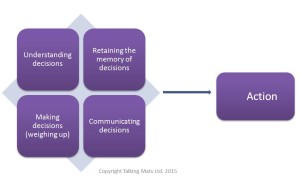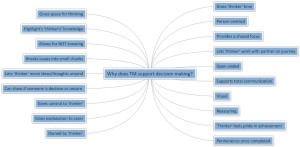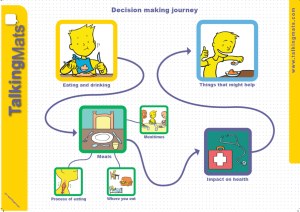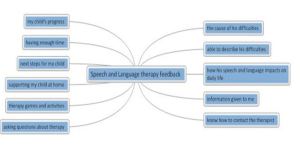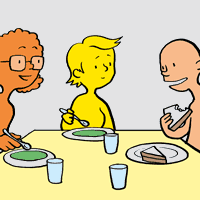Talking Mats is delighted to support Fair Trade through the purchase of new style bags which has come about through the initiative of one of our team, Margo Mackay. She has written the following blog:
The arrival of seven large boxes shipped from Kolkata caused great excitement in the Talking Mats office last week. For me personally opening up the boxes from the Freeset factory immediately brought a series of images to mind. Just over one year ago, at the start of 2014, I was part of a delegation of Scottish women who visited India to see businesses set up to help women who had been trafficked.
A tour around the factory revealed well organised systems with women busy working in production; cutting, sewing and printing bags ordered from all over the world. A factory like any other but with a significant difference. Most of the employees had previously been trapped in India’s sex trade which had robbed them of dignity. For them, getting a job in the Freeset factory gives the women a chance to regain control of their lives in a caring community.
They are given fair pay and conditions, offered education and health care. They are supported to make their journey out of prostitution and into a new way of living, restoring hope. Although a business, Freeset is also a community. The women are often dealing with health problems (including HIV/AIDS), and psychological effects from abuse and exclusion from society. This makes for a challenging workplace and much effort is put into creating a compassionate environment where the women are supported and their needs met.
As a Social Enterprise business, through selling our Talking Mats products, we are now participating in a woman’s journey to freedom. The transformation in women’s lives is clearly apparent, simply because they’ve been given a chance. We are proud to be supporting this enterprise.
Why don’t you have a look for yourself on their website? http://freesetglobal.com/
And why don’t you treat yourself to one of these attractive bags by buying one of our products
Talking Mats is delighted to announce that we have developed our own doggy Talking Mat to allow us to find out the views of our canine friends . Sally has been busy working on this as her swan song to Talking Mats . Sally has always been passionate about ensuring that pets are fully included in every Talking Mat. The Talking Mat for your dog launches on the 1st of April the day she starts her new job.
Good Luck to Sally in her new role as Head of Education , Research and Practice at Strathcarron Hospice -we know you will be as fab there as you have been here!
NB No dogs were harmed in the production of this resource.
We are delighted that Sally, our Senior Associate, has been offered the post of Head of Department for Palliative Care Education, Research and Practice Development at Strathcarron Hospice. We swing from being magnanimous to distraught!! – but it’s a wonderful opportunity for her and she will be a fantastic asset to their department. We will continue to work closely with her but we will really miss her as she has a key role in our team.
However, it also means that we are looking for another person to join us. See attached job description.
TM Associate job description
We are looking for a full time person to join the Talking Mats Team and depending on experience, level of skills and business acumen, the post will be either ‘Talking Mats Associate’ or Talking Mats Senior Associate.
The key roles are:
- To work with the Talking Mats team to provide high quality training throughout the UK and occasionally abroad
- To take a lead in gaining, developing and carrying out consultancy and project work
- To develop, launch, take products to market and increase sales
- To contribute, as agreed, to the day-to-day running of Talking Mats Limited
- To deputise for Directors as required
The closing date for applications is Thursday 26th March and the date for interviews is Thursday 2nd April.
If you are interested and think you would like to join our dynamic team please send a cover letter with your CV to joan@talkingmats.com or lois@talkingmats.com
Also, don’t hesitate to get in touch if you need any other information either by email or phone 01786479511
The inability to make a decision could be because of a learning disability, mental health problems, brain injury, dementia, alcohol or drug misuse, side effects of medical treatment or any other illness or disability. Click here for further information.
Both the Mental Capacity Act (2005) in England and Wales and the Adults with Incapacity Scotland Act (2000) identify the following components which determine whether or not someone has capacity to make their own decisions.
There are a number of additional assumptions that are central to determining whether or not someone has the capacity to make their own decisions:
• Every adult has the right to make decisions unless proved otherwise
• Everyone should be supported to make their own decisions
• People should be given the support they need
• People are entitled to make their decision – good or bad
• Each individual has a different capacity to make decisions about different aspects of their life.
We have been running seminars on how Talking Mats can be used to support a person’s capacity to make decisions.The diagram below illustrates some of the comments we received form participants at a recent seminar about the benefits of using Talking Mats to support decision making.
Click on the diagram to enlarge.
The process of completing a Talking Mat helps people retain their view and if they have memory problems the picture of the mat is a good prompt to enable recall.
Its worth noting that our brain processes visual images 60,000 faster than text!
Getting feedback on AAC services is particularly challenging because of the communication support needs of this group of people. It is therefore really important for AAC users to have the chance to say how they feel about the services they receive. Services need to make sure that this group of people have a voice and that there is a mechanism for their views to be taken into account in monitoring the quality of services and service planning.
NES has funded the opportunity for professionals to attend a seminar and go away with a resource to support them to get feedback from AAC users about their service. The Talking Mats resource was trialled and developed with Forth Valley AAC partnership and is based on AAC quality indicators (NES 2013).
This opportunity is free of charge to people in AAC partnerships in Scotland. You will attend a half day specialist seminar and go away with a free resource to use in practice.
The resource will help people find out how AAC users feel about:
- People who work with them
- How AAC services are delivered
It provides a model of good practice which could be extended to evaluate other services.
4 dates and locations are available.
Edinburgh- Tuesday 17th March 1.45 -4-.30pm
Dundee – Wednesday 18th March 1.45 -4.30pm
Glasgow Thursday 19th March – 1.45 -4.30pm
Inverness Friday 20th March 1.45 -4.30 pm
If you are trained in Talking Mats and wish to take up this great opportunity, please book your place as soon as possible.
sally@talkingmats.com or rhona@talkingmats.com
We really enjoy training people to use Talking Mats and are always inspired by the range of participants who are working hard to support people with communication disabilities. Here is some of the feedback we have received recently from the Talking Mats training courses that we have run.
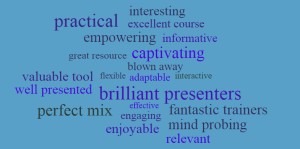
Recently we delivered two Talking Mats specialist seminars in London:
- Talking Mats and the Eating and Drinking resource
- Talking Mats and Capacity
Both seminars were very well attended with lots of discussion from a wide range of professionals.
During the Eating and Drinking seminar, we provided background on how and why the resource was developed and showed some DVD examples of people using the resource. This really brought things to life and showed how important it is to give people (with and without speech) the opportunity to consider and talk about different aspects of eating and drinking. We also gave people hands-on practice in using the symbols from each topic.
Each participant received a copy of the full resource, including symbols, a mat, and explanatory booklet.
During the Capacity seminar we discussed the fundamental principles the Capacity Act and participants had a chance to consider how Talking Mats can help people to:
- understand
- retain/remember
- weigh up information
- communicate their views/wishes and feelings.
They were also given the opportunity to work through some practical examples and think about options to help people understand issues and make decisions.
If you would like to attend our next specialist seminars, we are holding them in Stirling on 17th February: Stirling Seminars Feb 2015 flier
We are grateful to Nicola King SLT, who describes how she and colleagues use Talking Mats not only to gain feedback from parents about the therapy process, but also about the parent’s understanding of the child’s diagnosis and its impact.
The options to start the discussion are included in the mind map below. Click on image to enlarge.
Issues raised by one parent were
1) Information given to me –unsure . The mum went on to say ‘I’m worried/ frightened. I don’t want to ask too much as I’m frightened as to t he answers
2) My child’s progress –unsure. The mum offered ‘I’m inpatient’
Nicola commented –‘These were huge issues and each response gave me a chance to explore what she was thinking and meaning. For the first time this mum offered her fears about ASD and ADHD. She enjoyed the Talking Mats process and after the interaction agreed for the first time to an onward referral which ensured support was in place for her son starting school.
The Talking Mats format was a brilliant way to have that ‘difficult conversation’ ‘
One of the many ‘non-traditional’ uses of Talking Mats has been the work that has been undertaken with university students (both undergraduate & post graduate) at the University of Stirling. Since 2008, staff in the Career Development Centre at the University have been trained to use Talking Mats as a tool to help students to articulate their career thinking and planning.
We have established from our research and trialling of a range of topic cards that students respond well to the process. While the majority of the students we work with have no speech or language difficulties, the process of TM enables students to articulate their thoughts and to feel more at ease to raise particular issues. It can be very hard for students to talk openly about financial worries, academic issues, or career anxiety. TM gives a platform for this to be done in a non-threatening way and quickly allows the Careers Adviser to see where the student is ‘at’ in their thinking. This then allows the adviser to work more efficiently & effectively to support the student to develop their career plans /strategy.
Staff feedback would indicate that they enjoy working with TM in both one to one and group settings with students. There are many perceived advantages to using TM but one of the main ones is that it can make better use of the time available and that it can be a good way to see quickly where the key issues are that need to be addressed. TM also fits well with current Career Guidance Theory, allowing the student to narrate the ‘story’ and arrive at their own solutions to the ‘problem’ under discussion.
There are of course some students who do have additional learning needs and TM is again an ideal tool. In particular, students with dyslexia and dyspraxia comment positively that the visual aspect of the cards allows them to process the information and structure their thinking in a clearer way that just talking to a careers adviser can.
International students who sometimes have poor English language skills respond well to using TM as it allows us to get a clearer picture of the students thinking than sometimes is the case from a more ‘traditional’ discussion
Action Planning and Goal setting are a big part of the Career Management process and TM is a really useful tool to ‘kick-start’ this process for students. The visual impact is powerful and enables students to see clearly what they are considering and the cards allow the students to physically move the cards to help them to decide how to move forward in their thinking and planning. Students consistently comment that they appreciated the opportunity to see clearly the issues that they are considering and allow them to move forward.
Many thanks to Elaine Watson, Careers Adviser, University of Stirling and one of our accredited trainers for this stimulating description of how she is implementingTalking Mats
Whilst developing the eating and drinking resource, we tried it out with people with a range of eating and drinking difficulties. I talked to Ellie, who had swallowing difficulties following a stroke. She found it really helpful to use the mats to think about different aspects of meals (mealtimes, where you eat and the process of eating). Ellie had very good insight into her eating and drinking difficulties and had developed clear strategies to help manage them. She found breakfast and snacks the most difficult meals to manage. She was also very clear that pureed and soft moist foods were the safest and easiest for her. After we had done the mat, Ellie reflected on her eating and drinking, saying that it was limiting but that she could see that things had improved. One of the most difficult things for her was the impact of her swallowing difficulties on some of the social aspects of eating. She really misses going out for a meal with family and friends, something that we often take for granted.
Doing the ‘meals’ mat helped Ellie to see that although she still has many difficulties, mealtimes have become less stressful. For example, although eating and drinking is still a long, slow process, Ellie and her family have adapted to this and now manage ok, especially if they plan ahead. Some useful action points were also identified for the professionals working with Ellie – it would be good for her to have suggestions about a greater range of breakfast options as well as a variety of snacks which she could eat between meals.
Using the mats really helped to clarify the progress that Ellie has made with her eating and drinking since her stroke.
 Online training login
Online training login 

